Is your child sitting 11 plus exams this year? Having a good understanding of verbal reasoning question types yourself can go a long way in supporting their journey.
Because verbal reasoning isn’t a school subject, it’s really important that children taking 11 plus exams get plenty of help and practice to learn the skills and strategies necessary to pass.
I’ve included five example questions – have a go at them yourself and see how you get on!
This article continues this month’s verbal reasoning theme. If verbal reasoning is a completely new subject for you, take a look at my introduction to 11 plus verbal reasoning for parents article first and then come back here.
Affiliate Disclosure: This post may contain affiliate links. This means that I may receive a small commision – at no cost to you – if you make a purchase through these links. Thank you for your support!
GL Verbal Reasoning Formats
This article is aimed at helping children and families who are sitting 11 plus exams published by GL Assessments. A lot of the information applies to CEM or independent exams too, but there are some major differences in the topics and question types across exam boards. Always find out which exam your child will be sitting so that they can be fully prepared!
GL Exam Formats
There are two possible formats for the exam, so this is something else that you will need to check with each school you are applying to.
Exam papers will be multiple-choice, standard format or occasionally a combination. Multiple choice formats have one paper with questions and a separate sheet for children to mark their answers. Standard format tests have space to write the answers next to each question.
The length of exams can vary a little between schools, but is usually around 45 minutes per paper.
5 Verbal Reasoning Question Types Overview
Verbal reasoning questions can be organised into 21 question types. Each type involves using different skills or knowledge. If you’ve taken a look at 11 plus books or other resources, you may have noticed that verbal reasoning questions are grouped into different categories.
Publishers group questions in various ways, but in this article I am grouping them in the following way, which is the way that I teach them:
- Word meanings
- Making words
- Maths and Sequences
- Codes
- Reading information and using logic to solve problems
Let’s take a closer look at each of these groups and some examples of the types of questions to expect.
UPDATE
Since September 2023, CEM stopped providing paper-based exams, and although some schools opted to switch to their online exam service, GL has become the main provider of 11+ exams.
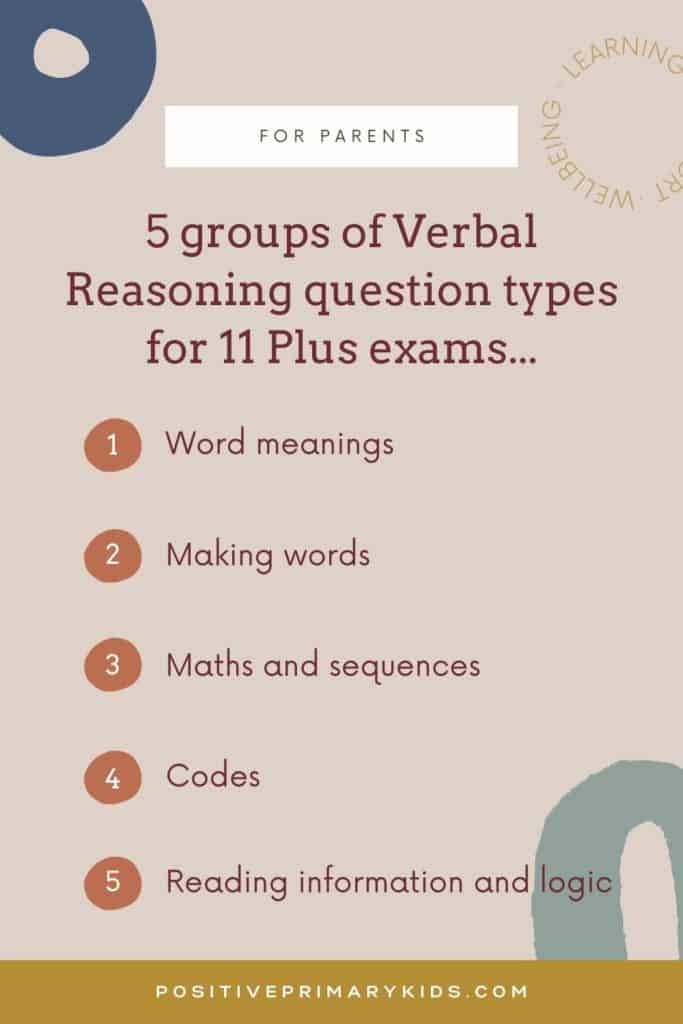
01 Word Meanings
Having a strong, advanced vocabulary and spelling skills are vital for verbal reasoning. Questions in this group test children’s ability to:
- Recognise and define words
- Identify synonyms (words with the same meaning)
- Identify antonyms (words with opposite meanings)
- Identify homographs (words with the same spelling but different meanings)
- Make connections between words
- Categorise words
- Identify words that don’t belong with others in a group
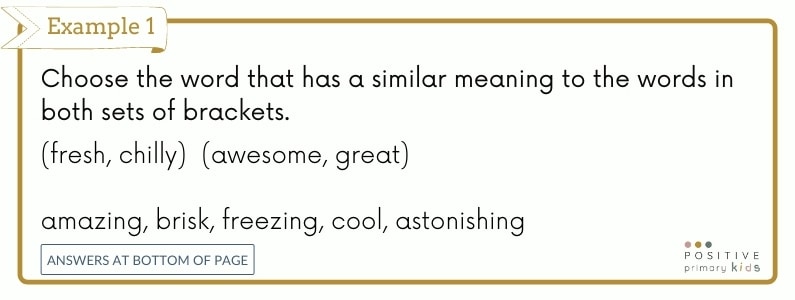
02 Making Words
This question group also requires an excellent vocabulary, but the questions have more of a puzzle element with children needing to manipulate words and letters to solve them. Children may be expected to:
- Find a word hidden between words in a sentence
- Make new words by adding letters, or moving letters
- Putting words together to make compound words
- Follow a pattern to make a new word
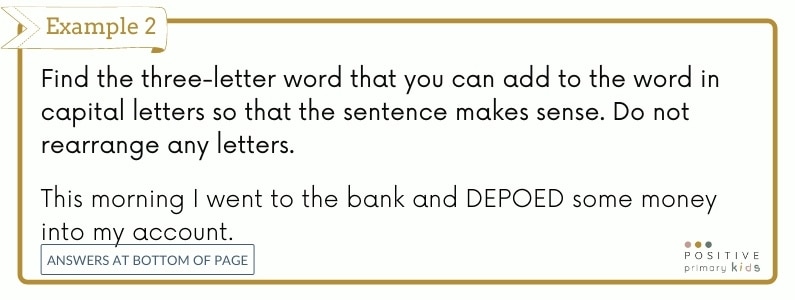
03 Maths and Sequences
Strong basic arithmetic skills are needed for these questions as well as being able to identify number patterns. Questions will test children’s ability to:
- Substitute letters for numbers to solve sums
- Continue number sequences
- Complete missing number sums
- Identify the relationship between sets of numbers
- Identify ‘special number’ patterns (multiples, factors, square numbers, cubed numbers, square roots, prime numbers, Fibonacci sequence etc).
![maths - verbal reasoning question type 3 Verbal reasoning question type 3. Each triplet of numbers is related in the same way. Find the pattern and use the rule to finish the final triplet. 3 [ 9 ] 4, 6 [ 45 ] 8, 7 [ ? ] 9](https://positiveprimarykids.com/wp-content/uploads/2022/04/maths-verbal-reasoning-question-type-3-1-1.jpg)
04 Codes
These questions involve coding and decoding using letters or numbers. They tend to be the most difficult questions because they are completely unfamiliar. Having a reliable strategy for each question type is essential. Knowing the alphabet thoroughly will help children work quickly and accurately. They will need to:
- Apply alphabet knowledge
- Identify patterns between letters or numbers
- Spot relationships between letters and complete patterns
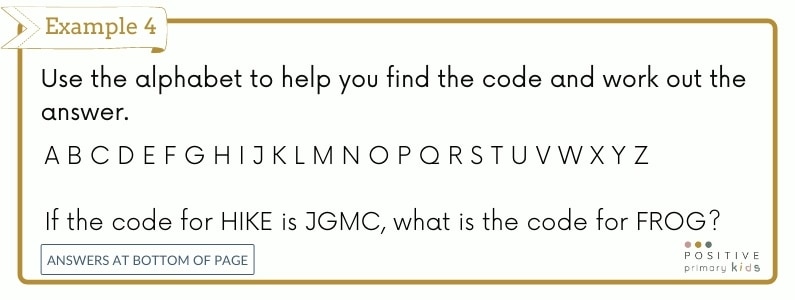
05 Reading Information and Using Logic to Solve Problems
Questions that fall into this group can vary a lot but most involve reading information carefully, picking out relevant information and processing it logically to solve them. To do this, children may need to:
- Identify and extract relevant facts and clues from text
- Work out how facts and clues relate to each other
- Use a logical system to organise information
- Work backwards through information
- Cross check information
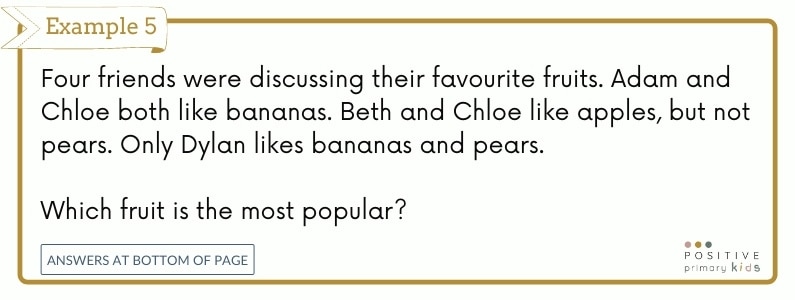
Next steps…
Your next steps will depend on where you and your child are on your 11 plus journey.
If you are just beginning to prepare, you will need to build up a picture of your child’s ability before jumping in.
These questions will give you a good starting point:
- Are they a proficient reader?
- How broad is their vocabulary and are they able to spell accurately?
- Do they have good general knowledge? For example, would they be able to name a variety of trees, metals or stone fruits?
- Do their teachers generally describe them as ‘above age-related expectations?
- How do they perform in exams?
- Do they enjoy puzzles like crosswords, quizzes and other word games?
You can find baseline tests in 11 plus books, such as Bond and CGP’s publications. The following books have suitable tests:
- CGP 11+ Verbal Reasoning for GL Assessment – Study Book and parents’ guide. Currently around £10 on Amazon here.
- Bond 11+: The Parents’ Guide to the 11+. Pictured below and currently around £5 on Amazon here
If in doubt, work on vocabulary!
Vocabulary and spelling are so important for verbal reasoning success, so if you are aware that they need to improve in that area, start there! Take a look at these 5 easy ways to boost vocabulary if you want some inspiration.
Secondly, you need an action plan for how you will support your child. There are various options to consider, all with their pros and cons and what suits you and your child might not be a great fit for another family. Some options include:
- Buy 11+ books and resources and provide support yourself
- Hire a tutor to work one-to-one with your child
- Hire a tutor who offers group lessons
- Find and use free resources and practice materials online
- Sign up for online workshops or courses
Whichever you choose and depending on how much support your child needs, I would recommend a combination of at least two options.
Answers
Did you have a go at the questions yourself? Check how you did here!
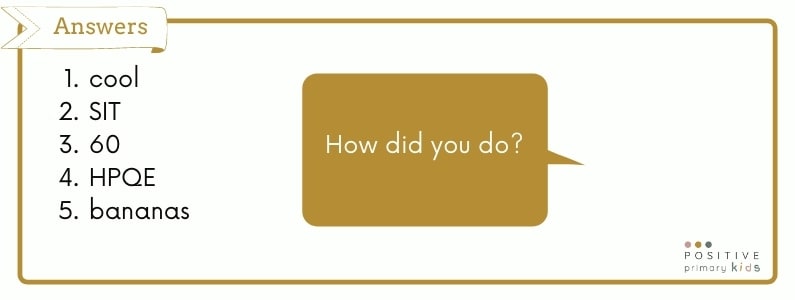
Are you doing DIY 11+ prep at home?
How are you providing support or planning to provide support? Any great tips or resources to share with other readers?
Let me know in the comments below!


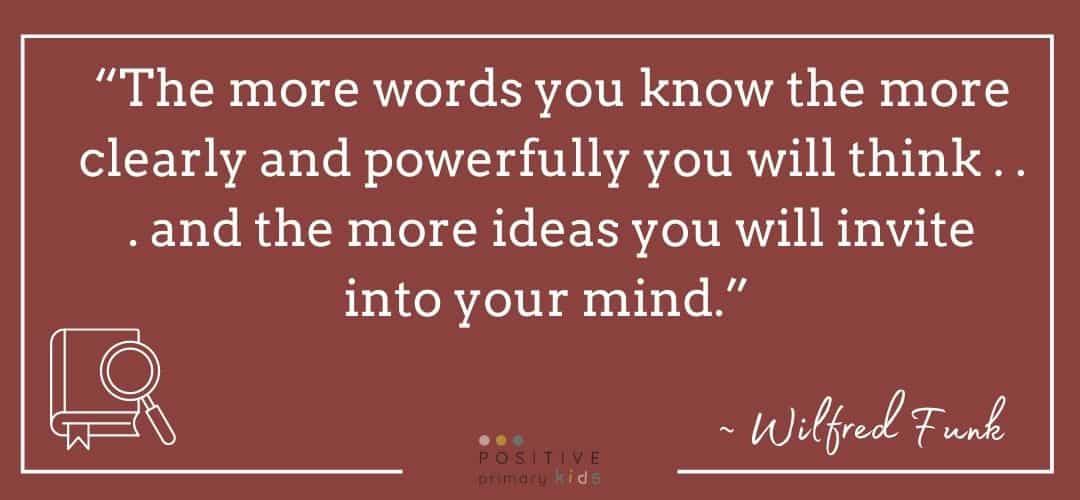





0 Comments